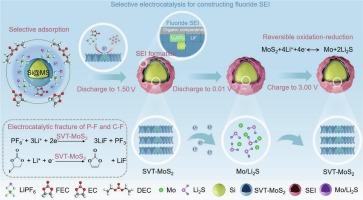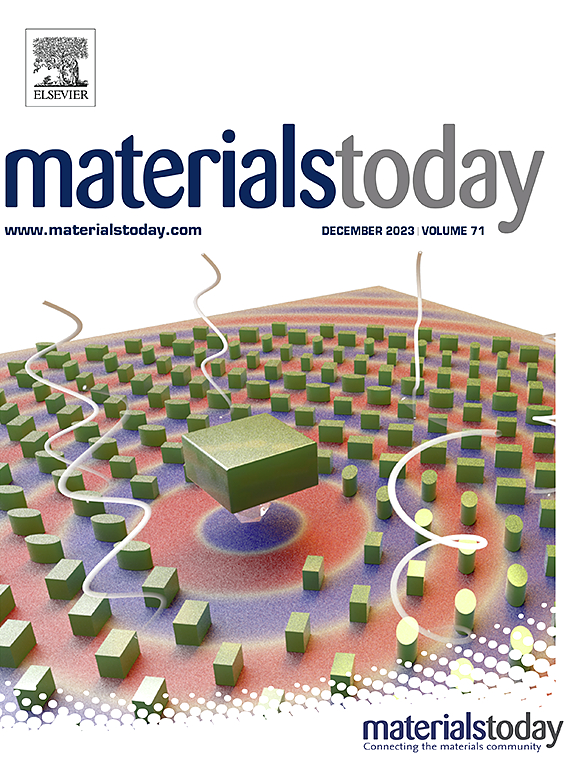Surface selective electrocatalysis-derived ultra-dense and mechanically robust fluorinated solid electrolyte interface for high-capacity and long-cycling silicon electrode
IF 22
1区 材料科学
Q1 MATERIALS SCIENCE, MULTIDISCIPLINARY
引用次数: 0
Abstract
The commercial application of silicon anode is significantly impeded by its poor cycling life due to the fragility and continued growth of the solid electrolyte interface (SEI). It is currently considered feasible to employ fluorine-rich electrolyte additives to derive LiF-rich SEI, while the decomposition of these electrolyte additives would simultaneously lead to the interweavement of loose and porous organic components with LiF-rich SEI, thereby destructing the compactness and mechanical integrity of the SEI. Herein, we propose the surface selective electrocatalysis strategy to construct ultra-dense and robust fluoride-SEI on the Si surface, and the surface 1T-MoS2 with rich sulfur vacancies can not only selectively adsorb fluorine-containing lithium salts and solvents, but also electrocatalyze the defluorination reactions of P-F and C-F bonds into fluorides. The optimized Si@MS electrode displays outstanding capacity retention of 95.5 %, and average coulombic efficiency above 99.8 % within 1000 cycles at 1 A g−1. This study provides significant guidance to design advanced anode materials for rechargeable batteries with long cycle life.

表面选择性电催化衍生的超致密和机械坚固的氟化固体电解质界面,用于高容量和长循环硅电极
由于固体电解质界面(SEI)的脆弱性和持续增长,硅阳极的循环寿命较差,严重阻碍了硅阳极的商业应用。目前认为采用富氟电解质添加剂制备富liff SEI是可行的,而这些电解质添加剂的分解会同时导致松散多孔的有机组分与富liff SEI相互交织,从而破坏SEI的致密性和机械完整性。在此,我们提出了表面选择性电催化策略,在Si表面构建超致密、鲁棒的氟化物- sei,具有丰富硫空位的表面1T-MoS2不仅可以选择性吸附含氟锂盐和溶剂,还可以电催化P-F和C-F键的脱氟反应生成氟化物。优化后的Si@MS电极在1 A g−1下,在1000次循环内的平均库仑效率高于99.8%,容量保持率为95.5%。该研究对设计先进的长循环寿命可充电电池负极材料具有重要的指导意义。
本文章由计算机程序翻译,如有差异,请以英文原文为准。
求助全文
约1分钟内获得全文
求助全文
来源期刊

Materials Today
工程技术-材料科学:综合
CiteScore
36.30
自引率
1.20%
发文量
237
审稿时长
23 days
期刊介绍:
Materials Today is the leading journal in the Materials Today family, focusing on the latest and most impactful work in the materials science community. With a reputation for excellence in news and reviews, the journal has now expanded its coverage to include original research and aims to be at the forefront of the field.
We welcome comprehensive articles, short communications, and review articles from established leaders in the rapidly evolving fields of materials science and related disciplines. We strive to provide authors with rigorous peer review, fast publication, and maximum exposure for their work. While we only accept the most significant manuscripts, our speedy evaluation process ensures that there are no unnecessary publication delays.
 求助内容:
求助内容: 应助结果提醒方式:
应助结果提醒方式:


